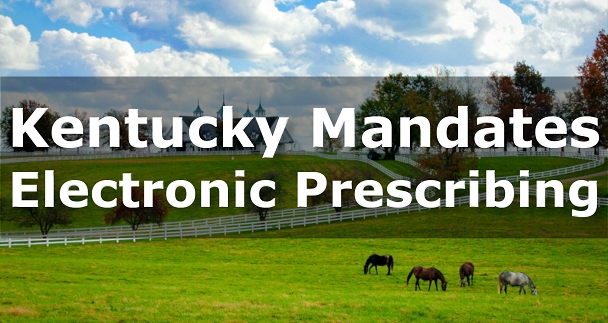Posted by MDToolbox
on
• Comments
(0)

Kentucky Governor Matt Bevin recently signed HB342 into law. This Act mandates Kentucky healthcare providers to electronically prescribe all controlled substances with an effective date of January 1st, 2021
Other subsections of this Act include:
- The act contains provisions for a waiver to delay the mandate for a specified time period for e-prescribing in the event of economic hardship, technological limitations, or exceptional circumstances, these are to be determined.
- Pharmacies are not required to verify if a controlled substance prescription received via written, oral, or fax falls within the state and federal laws.
Kentucky has remained above the national average for opioid-related overdose deaths since 2001, several years were double the national rate. In 2000, only nine counties in the U.S. had overdose death rates of more than 20 per 100,000 people, and four of these were located in Kentucky. By 2014, more than half of Kentucky counties had overdose rates that high. This represents a quadrupling of deaths due to drug overdose, from less than 250 in 2000 to more than 1,000 each year since 2010. According to the Kentucky Justice and Public Safety Cabinet, drug overdose deaths reached 1,248 in 2015. [1]
Over the past two decades, the Commonwealth has taken efforts to curb problems related to substance use. In 1998, Kentucky became one of the first states to launch a prescription drug monitoring program—the Kentucky All Schedule Prescription Electronic Reporting (KASPER) system to monitor medical use of controlled substances, such as prescription opioid painkillers. KASPER has since been enhanced and now offers health care providers and pharmacies real-time 24-hour access to prescription information that can be used to monitor and prevent overuse of prescription medications. Policymakers have also adopted policies aimed at reducing the impact of illegal drugs, such as passing the 2015 Senate Bill 192, which authorized expanded use of naloxone, a drug that treats opioid overdoses, and funded substance use treatment programs.[2]
Kentucky currently has only 18.9% provider enablement for electronic prescribing of controlled substances, which is below the national average of 33.4%. Pharmacy enablement for EPCS is 98.1% which makes Kentucky one of the states with highest percentage of pharmacies ready to receive electronic prescriptions. The current nation average for pharmacies is 95.2%.[2] There will likely be a big push leading up to 2021 to secure electronic prescribing, MDToolbox encourages providers not to wait!
Kentucky now aligns with several other states mandating electronic prescribing. MDToolbox looks forward to working with providers throughout Kentucky to ease the transition and help provide tools and resources in combating the opioid epidemic. With MDToolbox providers have access to tools such as Electronic Prescribing of Controlled Substances (EPCS) and convenient on the go mobile e-prescribing. Contact us for more information or to start your free 30 day free trial.